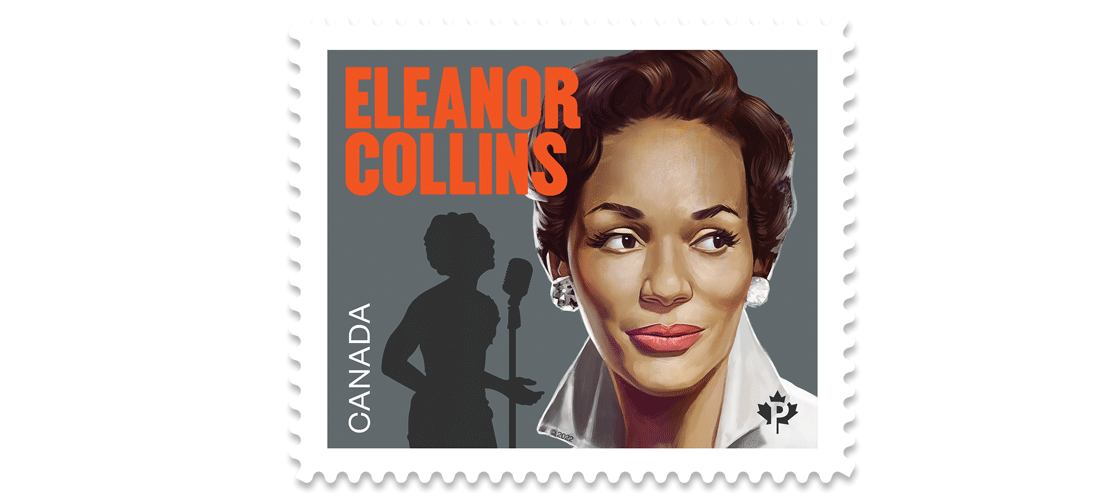Canadian jazz legend Eleanor Collins developed her vocal talents as a young girl, singing with her cousins and extended family. The gatherings served as a way for them to connect, express themselves and affirm their shared identity.
These were not informal family singalongs. Under an uncle’s firm direction, each member was assigned a key and a vocal harmony.
“I realize now that these gatherings were really the genesis of my musical training,” she recalls. “If you muddled your part, a real chastising followed. Fortunately, I guess I was born with what is called a musical ear that always allowed me to hear the right notes.”
Collins went on to make history in Canadian music and television in the 1950s. Her elegance, charm and moving performances on the airwaves and at clubs earned her the informal title of Canada’s first lady of jazz.
Born in 1919 in Edmonton, Alberta, Collins moved to Vancouver in the late 1930s, immersing herself in a thriving jazz scene. After appearing on CBC Radio with the gospel group Swing Low Quartet in the early 1940s, she began performing with Ray Norris for the jazz series Serenade in Rhythm. In the early 1950s, she started singing with other top musicians of the time, including Chris Gage, Phil Nimmons, Lance Harrison, Doug Parker, Fraser MacPherson, Don Thompson and Dave Robbins.
Collins emerged as world-class performer in the early days of television, when the CBC was scouting for new talent for live TV. After being discovered during a stage production, she made her television debut in a CBC variety series out of Vancouver called Bamboula: A Day in the West Indies, which aired in 1954.
CBC then showcased Collins’ elegance in The Eleanor Show in 1955, making her Canada’s first female jazz artist to host a national television series. Collins hosted another show, Eleanor, in 1964. She continued to appear on numerous television and radio shows through the 1950s, ‘60s and ‘70s, performing her last concert in Vancouver when she was in her mid-90s.
She says she had no sense of being a trailblazer at the time.
“The producers, technicians and talent were all pioneers together. So we each did what we felt we were called to do – live in the present and make the best decisions we could in support of that. How history regards or records our lives in retrospect, in reflection, is up to history,” she says.

A pioneer of Canadian jazz, Collins comes from a family of pioneers, of sorts. Her parents, of African American and Creole heritage, were among the approximately 1,500 Black homesteaders who emigrated from the United States and settled on the Canadian prairies in the early 20th century.
Collins’ journey to national success did not come without its challenges. She confronted racial prejudice in her own way – at a time when Black citizens to the south were still living under racial segregation and harsh Jim Crow laws.
After Collins and her family moved to Burnaby, B.C., a Swedish neighbour showed her a local petition that had tried to prevent her family from living there.
“The hostilities, name calling, bullying and barriers came as no surprise. I knew that we had to develop a strategy to help create a climate in which our children could live without harassment. For me it was about increasing my visibility in the community so people could get to know me,” Collins says.
Collins did just that. She used her music to help raise funds for a variety of civic and charitable organizations. She went to schools to encourage students in music education. She joined the parent teacher association and church choir, taught music to the local Girl Guides group, and visited and sang for patients in the children’s hospital and prison inmates.
“Eventually, as they grew to know us as contributing members of the community, our house became one of the central social gathering spots for all the children. It was my hope that I could help bridge the perceived differences that divide people instead of unite,” Collins says.
Collins had four children with her husband of 70 years, the late Richard Collins. At 102 years old, she says her family has been the secret to a long, vibrant life. Collins says she is grateful to be alive in this day-and-age, for the quality of life she maintains, for all the acknowledgements of her life and work, and for all those who have been part of her journey. “It all has been a real blessing,” she says.
Canada Post honours jazz legend Eleanor Collins with stamp
Available now